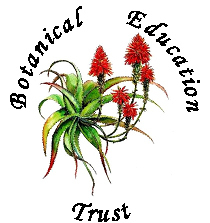The Botanical Education Trust has invited suitable applications for funding from any part of South Africa.
The Trust operates under the auspices of the Botanical Society of SA (BotSoc) and is fully registered and approved as a Public Benefit Organisation (PBO). It operates under the auspices of the KZN Coastal Branch of the Botanical Society and its objectives are to promote and advance education and research in the field of indigenous South African flora.
Past beneficiaries of funding from the Trust include a book helping botanists identify 51 main plant families; a study of a very rare aloe only found in the Ukhahlamba-Drakensberg in Limpopo Province. Last year the Trust awarded over R120 000 to projects as diverse as the Roselands Trust, which exposes young people to the natural environment, and capacity building in botanical sciences among older students whose research contributes towards higher degrees.
Explaining the significance of the awards, SANBI on their website wrote:
Because taxonomists seldom appear in the limelight of botanical research, they often find it difficult to attract funding for their systematic studies. However, their work is of vital importance in advancing the knowledge of our flora. Without knowledge, the protection of our indigenous plants becomes virtually impossible. It is for this reason that these awards of the Botanical Education Trust are significant and important in assisting taxonomic research.
In their invitation for applications, the Trust says applications in line with its aims will be considered. The most important is to advance education and research in the field of indigenous South African flora and factors influencing it, for example natural environmental factors, alien invader plants, etc.
“This item will be the main objective of the Trust and preference will be given to funding work likely to have a positive influence on indigenous plant conservation.”
Assisting in the publication of literature pertaining to indigenous South African flora and factors influencing it, and promoting indigenous South African flora “in any way the Trustees see fit” are their other stated aims.
Recipients of awards from the Trust must be resident in South Africa, with preference given to South African citizens. In the case of associations, preference will be given to public benefit organisations registered in the Republic of South Africa.
Grant applications forms, or any further information required, can be obtained from the Trust’s chairman: charlesbotha@gmail.com or on 031 209 3929.


